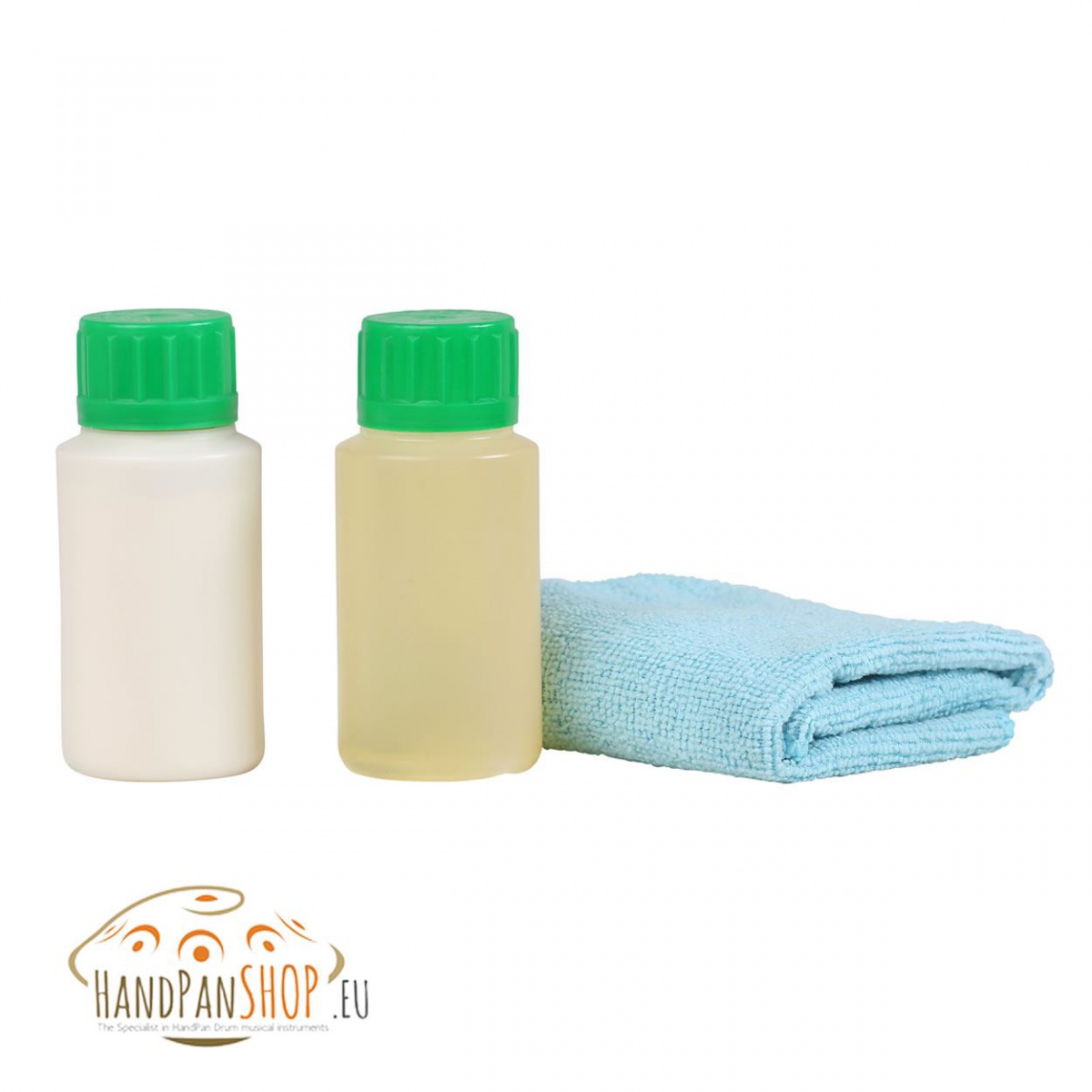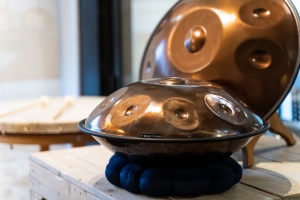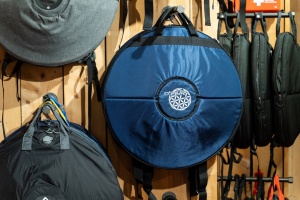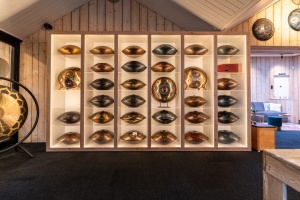Maintenance handpan
Best care and protection of the handpan
A good quality handpan can really take a lot, but a certain amount of protection and care will help you enjoy your handpan for a very long time. Below we provide the best possible care advice. However, these are guidelines and not strict rules.
Inhoud
Protect your handpan
Bumps and falls
Obviously, it is important to avoid drops and bumps, so that the note fields won’t get out of tune. Therefore, always store your handpan properly and use a decent display stand or standing stand.
Pollution
Don't forget that your handpan can also be damaged by certain (liquid) substances. For example, salt and acids. That is why it is best practice to always wash your hands before playing.
Misuse
A note field also gets out of tune due to incorrect use. A handpan is meant to be played with your fingers. Preferably don't play with a flat hand like you play a djembe, for example. Sticks can also damage the surface, which affects the tone. Please, remember to remove any rings and other metal objects from your fingers and hands to avoid damaging your handpan. And be careful with (small) children; when a metal spoon hits the handpan hard, it can 'detune' a note field.
Climate
Some handpans drums can rust. To prevent that, it is important to keep your music instrument away from humid conditions as much as possible. Here are some tips:
- Do not store the handpan in a damp cover or case.
- Prevent condensation by keeping the pan no longer than necessary in a handpan case or cover, but place the pan on a stand or cushion.
- Don’t be concerned if your handpan gets a little wet, for example due to rain. Just make sure to dry the pan thoroughly afterwards (don’t forget to also dry on the inside!)
- Exposure to salt may expedite rusting or cause nasty staining. If you play on or near a beach, treat the handpan with oil before using it. And immediately clean your handpan after playing.
- A handpan can easily cope with high or low temperatures (-30 to +30 °C /-22 °F to +80 °F). Due to a change in temperature, the tuning will always change slightly. This is normal and will not cause permanent tonal changes or damage to the instrument. The tuning will change back to its original state when the temperature returns to normal. However, extreme temperature differences can be a problem. We therefore recommend that you never leave the handpan in direct sunlight (especially behind a window or in a car) or next to a heating source (radiator, stove, fireplace, etc.). If a handpan becomes so hot that it is painful to put your hand on it (like a bonnet that has been in the sun for a while), the handpan can produce a changed sound. However, if you really need to transport your handpan by car, please make sure it is properly covered and put out of direct sunlight. The handpan may still get a little warm, but it can handle that just fine.

Taking care of your handpan
Treat with handpan oil
To keep the appearance and sound of your instrument beautiful, we advise you to wipe your handpan every time after playing and treat it with a natural oil. The oil protects the material against external influences such as dirt, acid and grease.
How do I apply oil to my handpan?
Step 1:
To remove any dirt residue, first clean the handpan with a clean cloth and alcohol (70-96%), available at the drugstore or pharmacy (this is called Alcohol Ketonatus).
Step 2:
After the pan has dried thoroughly, apply a few drops of maintenance oil to the handpan. You spread this gently and evenly with a microfiber cloth on the entire surface, including the edges. Remaining oil can be removed with a clean cloth.
Note: At a certain point, your cloth becomes saturated and then you can apply less oil. If the cloth you are using has become really dirty and sticky, you might want to start with a new one.
Step 3:
If you play bare legged, for example during the summer, also clean and oil the bottom of the handpan. You do not have to clean the inside of the pan.
NOTE: Both the cleaning as well as applying the oil must be done with care. Do not press the handpan too much.
Which oil should I use for my handpan?
It is important that the oil consists of natural oils and does not contain any aggressive substances such as turpentine. We advise a good quality oil such as Chaya® handpan oil or Phoenix oil.
We provide you with free oil and a good quality cleaning cloth when you buy a handpan!
Cleaning and removing stains from the handpan
Dirt, stains or old oil residues can be removed with alcohol (70-96%) available at the drugstore or pharmacy (this is called Alcohol Ketonatus). Then oil the pan again (see above for instructions).
Maintenance of the different kind of metals
The advice given above applies to all handpans. We are happy to give you additional information regarding the different types of metals that are being used for fabrication.
Nitrous steel
Nitrated steel is well protected against external influences, including rust. Nitration influences the sound colour positively; the metal keeps its shape and also provides good protection.
Stainless steel
This metal is well protected against external influences, especially against rust. Yet there is a small chance that this still will happen. It is therefore important to properly protect and maintain these instruments.
Ember Steel
Ember steel is a kind of stainless steel that has been especially developed for handpans. Due to small different chemical and mechanical features, this steel reacts much faster to dirt and moisture. To avoid stains it has to be cleaned. Therefore, preferably after playing, always clean with alcohol and then treat with handpan oil. However, stains are pure optically and have no influence whatsoever on the durability and/or the sound of the handpan. Over time, all Ember Steel handpans will discolour slightly. It is of personal opinion if you like that kind of ‘Patina’ or feel that it is a pity. People that care for a beautiful looking handpan can better choose for a different metal.
Blue Steel/RAW-Steel/Untreated Steel
This metal is the most sensitive to damage such as rusting Therefore handpan drums made of these deserves extra attention in terms of maintenance and protection. It is good to know that this type of steel is hardly being used .
Google reviews: (Google translated from Dutch)
Thomas Kwakernaat: “The service and reception are nice, you get plenty of room to ask your questions and honest answers. The chaya that I was allowed to make in 432 Hz is in my favorite key C Harmonic Mineur with the new steel species used, I think the hand pan sounds significantly more beautiful than my original pan. TNX !!! ”











